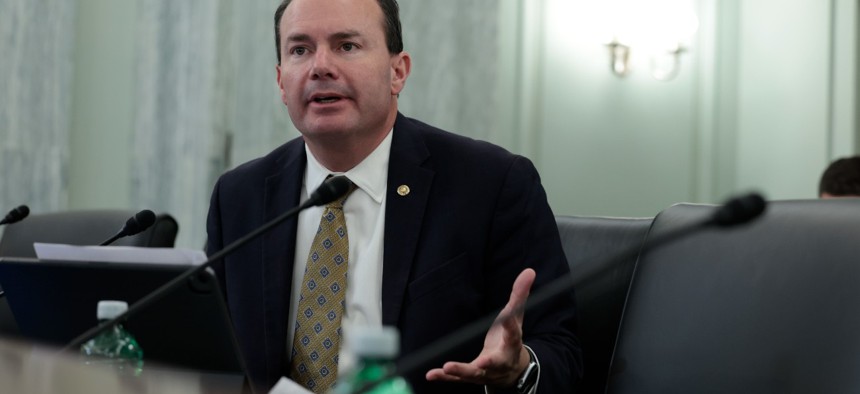
Sen. Mike Lee, R-Utah, is leading a small group of senators insisting on a vote on an amendment to block funding for Biden's vaccine mandates. Anna Moneymaker/Getty Images
Republicans Are Slowing Down the Passage of a Stopgap Spending Bill Again, as a Shutdown Draws Closer
For now, leaders are optimistic concerns over vaccine mandates and crack pipes will not derail the continuing resolution's passage.
A small group of Republican senators is threatening to derail plans to pass a short-term spending bill and avoid a government shutdown, creating uncertainty with just days until the next deadline.
For now, leaders in both parties are optimistic they can move a continuing resolution to keep agencies afloat through March 11. The House has already approved the three-week stopgap measure and the Senate must follow suit by Friday evening so federal offices are not forced to shutter.
The chamber appeared on pace to swiftly pass the CR, but a handful of Republicans have raised two concerns. Six senators are once again calling for a guarantee no federal funds go toward enforcing vaccine mandates, even though all of the Biden’s administration's requirements not aimed at health care workers or military members are currently paused or rescinded after legal challenges. Led by Sen. Mike Lee, R-Utah, the lawmakers said they would not allow for a hastened schedule for the stopgap bill unless the Senate also takes up an amendment to block funding for vaccine mandate enforcement.
Lee and several colleagues threw a similar wrench before the Senate passed the previous CR, and the vote on the anti-mandate amendment failed.
Separately, Sen. Marsha Blackburn, R-Tenn., has put a hold on the stopgap measure—blocking quick consideration through unanimous consent—over previous reports that the Health and Human Services Department was providing grant funding through its harm reduction program to organizations that offered individuals pipes for smoking crack. The Biden administration has repeatedly called the reports false and HHS Secretary Xavier Becerra said none of the grant funds would be used for pipes. Still, Blackburn said she is seeking additional assurances and will not abandon her hold.
Senate Minority Leader Mitch McConnell, R-Ky., said on Tuesday the Senate would be able to resolve the issues through amendment votes.
“I think it’ll all be worked out,” McConnell said. “There’s no risk of a government shutdown.”
His counterpart, Senate Majority Leader Chuck Schumer, D-N.Y., said he was “very optimistic” a shutdown could be avoided.
“We will cooperate with [McConnell] and I do not believe Republicans want to sponsor a Republican shutdown,” Schumer said.
The House passed the short-term bill earlier this month by a comfortable 272-162 margin. The measure would be the third continuing resolution of fiscal 2022, after Biden signed stopgaps into law in September and December. While Republicans briefly floated pushing a year-long CR, negotiators are now signaling a year-long omnibus appropriations bill is within reach. Top lawmakers said last week they reached a breakthrough agreement on a spending framework, which Schumer later clarified included top-line funding levels. Appropriators must still iron out the exact spending for every federal program and office as part of the 12 individual bills that will make up the omnibus.
“In any successful negotiation, both sides have to compromise, and this agreement is no different,” Sen. Patrick Leahy, D-Vt., who chairs the Senate Appropriations Committee, said last week. “But I believe we reached a strong, bipartisan agreement that will allow us to make significant investments in the American people and our communities.”







